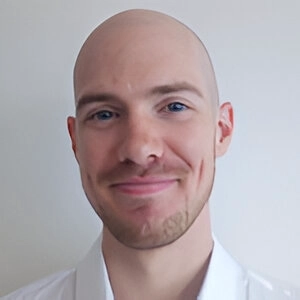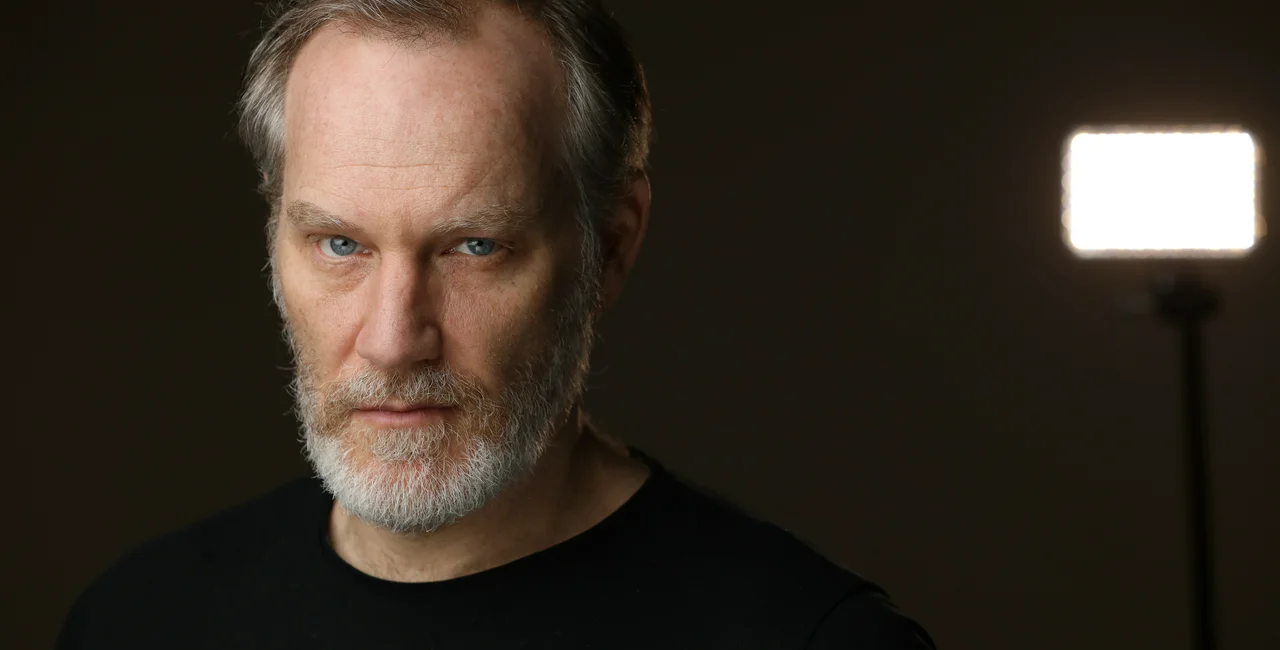Prague-based actor Brian Caspe has been appearing in films and TV series since 2002. He shares insights into the craft of acting and how it’s shaped his life, what actors need to succeed, why he loves teaching, and how he (and other actors) are coping with the lockdown.
It’s hard to tell if Brian Caspe became an actor because he’s so open or the other way round. Either way, he’s as comfortable delving into the art of acting as he is sharing details of his life, from a childhood passion for music to a list of screen credits including Carnival Row, Jojo Rabbit, Anthropoid, and countless other films and TV series.
From childhood to Hollywood to Prague
At 6 years old, Brian memorized Monty Python routines and wrote musicals to perform for his family; in high school, he appeared in musicals such as Bye Bye Birdie, Oliver! and Sweeney Todd.
At the University of California San Diego, Brian considered becoming an aeronautical engineer, but didn’t have the required knack for math and science (“I quickly failed both classes”) and ultimately majored in music with a focus on singing (“I figured I wouldn’t fail”). He also appeared in student plays, and after a strong performance near the end of his university career, he was offered a role with the San Diego Repertory Company.
Brian’s first acting job whetted his appetite enough that he moved to LA to take a stab at Hollywood. But five years later, after mostly working at a temp agency and appearing in amateur plays, Brian was itching for a change. His biggest regret from college was that he never studied abroad (“too lazy to write the essay,” he confesses) and he also wanted to develop as an artist, so he looked for a way to do both.
A plan to study opera in Russia was derailed when the California native considered the difference in climate. What, he wondered, is halfway between sunny Los Angeles and frozen St. Petersburg?
Brian added Prague to a trip through Europe after his cousin mentioned a family friend there who ran a casting agency — Maya Volavá, of Myrnyx Tyrnyx. After meeting Brian, Maya was sure he would find work in Prague, so by May 2002 he was living in a shared apartment, sleeping on a mattress his roommate had found in the street, and rationing out a meager weekly budget.
Between auditions, Brian, his friend Cathy Meils, and several other actors started Second Sundays, a bi-monthly English-language cabaret show; Brian’s fondest memory is working with friend Mick Sweeney to arrange a collection of George Gershwin songs to tell the stories of a group of down-and-out barflies.
Each payday let Brian measure out a few more weeks in Prague. A spot in a cigarette commercial meant he could rent an apartment, afford a new mattress, and measure his stay in months instead of weeks. Soon after, he booked 5 months of work in 2004’s Hellboy, and has worked regularly since then, finding bigger and bigger parts.
A commitment to craft
To Brian, acting and singing are the truest forms of expression. His initial plan to move to St. Petersburg was inspired by “Stanislavski on Opera,” a book by Russian acting teacher Konstantin Stanislavski that aimed to train opera singers to give more emotionally realistic performances; St. Petersburg is a kind of Mecca for studying his techniques.
Now, Brain practises (and teaches) the Meisner technique, which he first encountered at L.A.’s Playhouse West — “You could feel the truth the moment you walk in the class...it was magnetic.” The technique was developed by renowned acting teacher Sanford Meisner, who trained actors how to “live truthfully under imaginary circumstances.”

But no method or technique is a quick fix. Brian’s advice for actors focuses on the work they need to put in: “Whatever level you’re at, compete for the next level. Do the work for the next level up. When you do that, you’ll blow the other people on your level out of the water.”
Jared Harris, who Brian worked with on Carnival Row, has a work ethic Brian really admires. “{Harris} really mulls things over, goes over and over how he will respond and interpret the script, hours and hours and hours of work. That’s what people do who are at that level. They work on it all the time.”
Cimrmanology
Brian got be a part of something uniquely Czech in 2014, when actor Ben Bradshaw invited him to do a reading of The Stand-in, written by the famous (and fictional) Czech universal genius Jara Cimrman, brainchild of Czech actors and directors Zdeněk Svěrák and Ladislav Smoljak. Brian subsequently joined the newly-formed Cimrman English Theater.
The company’s repertoire soon included The Conquest of the North Pole, The Pub in the Glade, and The Act. The plays were translated with the assistance of Hanka Jelínková, daughter of Zdeněk Svěrák, who ensured faithfulness to the original material.
The company even did a US tour in 2017, chiefly organized by Brian’s wife Dagmar, in conjunction with Czech embassies and cultural centers in the US, and largely driven by Alena Kotkova (producer of the original shows). Due to the plays’ format — Cimrman seminar in the first act, Cimrman play in the second — the company had to add a disclaimer, telling audiences that everything they were about to see was fake; some theatergoers had left during intermission, underwhelmed by what seemed like a very strange lecture.
It turns out that despite being so distinctly Czech, the humor of the Cimrman plays has a universal appeal; once they were clued in, American audiences (many of whom were brought along by Czech expats friends) loved them.
Due to his increasing shooting schedule, Brian has stepped back from the theater, but it’s something he really misses.
Birth of a teacher
Brian’s drive, shaped by LA’s cutthroat casting culture, was a few gears faster than the easygoing acting community he found in Prague, where actors rarely prepared for auditions or worked on their skills. He started teaching other actors the Meisner technique in order to have someone to practice with, but organizing regular rehearsals was frustrating — until Brian and another Meisner devotee named Ben Steele found a space they could use and resolved to hold regular sessions. “The Electric Space” was an unheated, uninsulated machine shed with some gas heaters that only made you light-headed sometimes (perhaps the perfect place for acting exercises).

Brian found that coaching his fellow actors — and then his students — through a kind of emotional awakening proved to be more rewarding than he expected; “the lightbulb moment when they finally get it is something I never get tired of,” he says.
The class has been going strong since 2010, now in a space on Františka Křížka. Fifteen years ago Brian’s fellow actors may have treated the class as a hobby, but now students practise outside of class and prepare for their auditions. A set of rules ensures students treat the class with respect — mobile phone usage and gum chewing are fined, and interrupting another student’s exercise is simply unthinkable. It also helps that Brian has a certain gravitas, built over years of working on film sets and whipping actors into shape, that encourages students to take the class as seriously as he does.
What is this “Meisner” thing?
“The craft of acting has a lot to do with learning how to be open and vulnerable, and to let out what you’re feeling,” Brian explains. The Meisner technique gets at the foundations of acting: listening to your partner and expressing your true emotional response. But if you spend 40 hours a week in an open office, grinding your teeth while your coworker slurps his tea, how can you shift gears into acting on instinct?
The exercises are based on repeating simple phrases. The first exercise is simply standing eye-to-eye with another student and stating an article of clothing they’re wearing: “You’re wearing jeans,” “I’m wearing jeans,” “You’re wearing jeans.” Once you’re tuned in, you move on to describing your partner’s emotional state — very often, “You’re laughing.” When their feelings change, you tell them so, and they do the same for you. Next, you add a hands-on activity of your choosing, imaginary circumstances — and eventually, even a script.
As odd as it sounds, the responses are real. People laugh, cry, scream, panic, and storm out of the room. There are only a few rules for what’s not allowed, such as no unwelcome contact, no destruction of property, and absolutely no sarcasm.
Under lockdown
Brian had long wanted to do a podcast, but didn’t know what form it should take. Recently, he (virtually) united with fellow actors/teachers Gary Condes and Andrea Helene to create the Vagabond Actors Podcast. Topics have included emotional preparation, getting an agent, text analysis, and dealing with rejection. The podcast’s relaxed vibe and insider feeling make it compelling for both new actors and curious listeners.
Brian is clearly suited to the life of an actor. He wears his heart on his sleeve, and brings that honesty to all his characters. In both his classes and his podcast, he offers idealism and pragmatism in equal measure; his advice ranges from the Zen (“Don’t be so intellectual”) to the pragmatic (“If you have an audition, learn your lines”) and all aims to help students and listeners develop as actors. What does Brian hope to see in his future? “Bigger and better parts...with more impact on the story,” he says. Here’s hoping he lands them.
For more about Prague Playhouse visit acting.cz; you can tune into The Vagabond Actor's Podcast at vagabondactors.podbean.com.












 Reading time: 7 minutes
Reading time: 7 minutes 

































